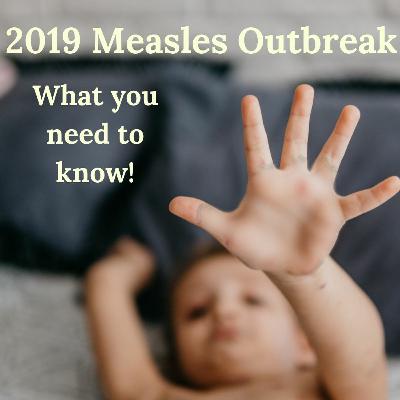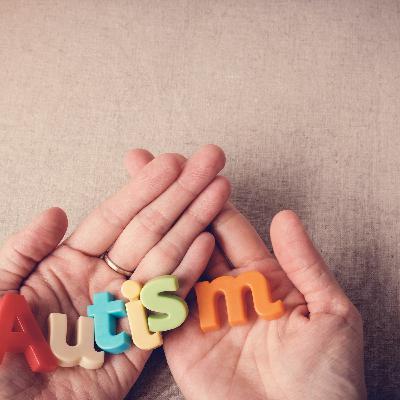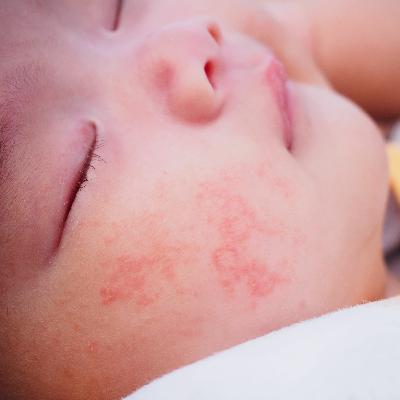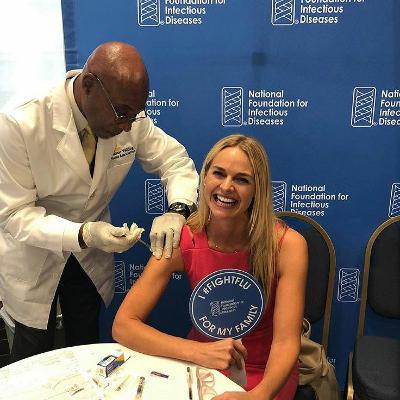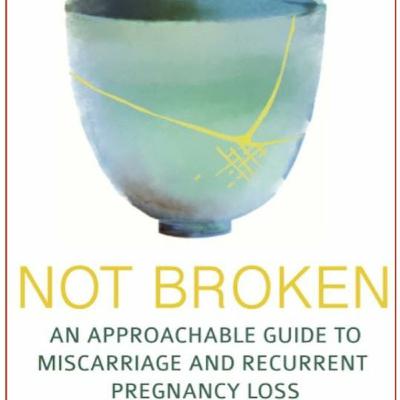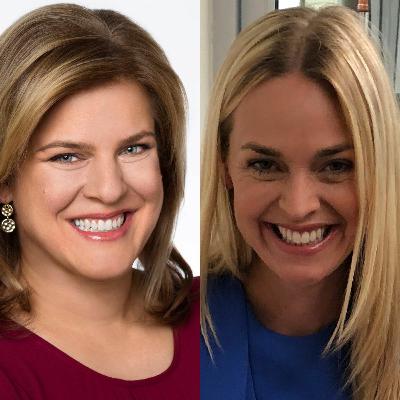Discover Seattle Mama Doc
Seattle Mama Doc

Seattle Mama Doc
Author: Dr. Wendy Sue Swanson
Subscribed: 307Played: 809Subscribe
Share
© All rights reserved
Description
Dr. Wendy Sue Swanson is a mom, pediatrician, blogger, Chief of Digital Innovation for Seattle Children’s Hospital, & news reporter for NBC KING5 in Seattle. She has over 38,000 followers on Twitter, & her feed, Seattle Mama Doc, was named one of Time's "Best Twitter Feeds of 2013". While a practitioner of pediatric healthcare in the traditional sense, she approaches all of her work from a far more holistic wellness perspective, as evident in the content of her blog as well as her award-winning book, Mama Doc Medicine. Dr. Swanson founded Digital Health at Seattle Children’s in 2013, leading a team in innovation by testing and creating new digital tools to leverage peer-to-peer education & the wisdom of patients, families & providers.
117 Episodes
Reverse
Pediatrician, Dr. Wendy Sue Swanson, highlights what you need to know about the current measles outbreak. Take solace if you and your family members have been vaccinated, the vaccine is wildly effective with protection rates at 98% after your second dose. If your child is too young to be immunized, Dr. Swanson gives her recommendations about what you should do to protect your baby.
What to do when waiting for an autism evaluation? Pediatrician, Dr. Wendy Sue Swanson, and Jim Mancini, a speech-language pathologist and coordinator of parent education and support at the Seattle Children’s Autism Center, discuss the autism diagnosis process. Mancini shares his tips and recommendations for parents who may be on long wait lists.
Pediatrician, Dr. Wendy Sue Swanson, and pediatric dermatologist, Dr. Markus Boos, provide straight forward ways to treat teen acne. Lots of myth busting and over the counter recommendations for treating acne. It’s not about vanity, it’s about self-esteem, healthy habits, and putting your best face forward.
Pediatrician, Dr. Wendy Sue Swanson, and pediatric dermatologist, Dr. Markus Boos, review guidelines for treating mild, moderate, and severe teen acne.
Pediatrician, Dr. Wendy Sue Swanson highlights recent studies on teen depression and suicide ideation. The number of kids hospitalized for thinking about or attempting suicide doubled in less than a decade. Half of parents whose child had suicidal thoughts were unaware. Even if you’re feeling in tune with your teen, it’s important to have every child over age 12 screened for depression.
Pediatrician, Dr. Wendy Sue Swanson dives deep into technology and the impact it’s having on our children’s developing brains and well-being. From Fortnight, to screen time, and smartphones, our tweens and teens are growing up digital and many parents are feeling overwhelm and angst. She shares her tips and what parents need to know.
Pediatrician, Dr. Wendy Sue Swanson shares her tips for surviving and soothing toddler tantrums. When you come from a place of empathy and compassion, instead of anger, the outcome may surprise you.
Pediatrician, Dr. Wendy Sue Swanson highlights a recent study that found that more than 10% of U.S. adults have a food allergy -- and nearly double that believe they do. 50% of people with a food allergy develop them in adulthood. If you think you have a food allergy or sensitivity, make an appointment with your doctor, you may be avoiding foods you don’t need to.
Pediatrician, Dr. Wendy Sue Swanson and pediatric dermatologist, Dr. Markus Boos explain diaper dermatitis (or diaper rash) and how to take care of your baby’s skin. Use the “cupcake” method by layering thick cream on each diaper change and avoid wiping it off all the way with diaper wipes.
Pediatrician, Dr. Wendy Sue Swanson, and pediatric dermatologist, Dr. Markus Boos, explain causes of eczema and ways to treat flares. Protective, emollient barrier creams used daily are key to preventing eczema. Always go for the “scoop-able” creams when you can (lotions just have more water). Often topical steroids (they are safe to use for 10 days at a time) help dramatically. More on bleach baths, staph overgrowth, and ways to control itching, too.
Tips for parents on the new car seat guidelines out from the American Academy of Pediatrics. Dr. Wendy Sue Swanson explains that infants and toddlers should ride in a rear-facing car safety seat as long as possible. Parenting tip: don’t let your children ride in the front seat until they are age 13 and keep them in their booster seats until they are 4’9” tall and around age 10.
The flu shot is your best shot at reducing the likelihood of influenza. Pediatrician Dr. Wendy Sue Swanson explains the 2018-2019 influenza vaccine recommendations and highlights a new Amazon Alexa skill called Flu Doctor. Enable the skill on your Alexa app and ask her to “open Flu Doctor” to learn more about the flu vaccine, where to get the shot, how to help children with needle fear, and much more.
Dr. Wendy Sue Swanson and reproductive endocrinologist, Dr. Lora Shahine discuss the emotional and physical complexities of pregnancy loss, statistics, and steps you can consider taking if you have suffered from recurrent pregnancy loss.
Dr. Wendy Sue Swanson and reproductive endocrinologist, Dr. Lora Shahine discuss infertility & secondary infertility. If you’re less than 35 years old, almost 80% of women will become pregnant within 12 months. If you’re over 35 and have been trying for 6 months, you should consider seeing a doctor. Amazing statistics, words of hope and Dr. Shahine’s expert recommendations.
Pediatrician, Dr. Wendy Sue Swanson discusses preeclampsia with expert, Dr. David Reuter. PSA to all pregnant moms out there: treat yourself (and your baby) to 4-6 hours of “belly down” time each day after 20 weeks. Lay on your side, float in a pool, get a prenatal massage on a tummy pillow. When you lie on your back, blood flow can sometimes increase congestion to your kidneys causing elevated blood pressure. Women with preeclampsia (high blood pressure during pregnancy) often have babies prematurely and with increased complications. Tell every pregnant mom you know! Belly-down-time-goodness!
Parents can learn how to curb disruptive behaviors in their children with autism. Pediatrician, Dr. Wendy Sue Swanson, and Clinical Child Psychologist, Dr. Karen Bearss discuss autism and disruptive behaviors. Up to half of children with ASD exhibit high rates of disruptive behaviors, such as tantrums, aggression & property destruction. Dr. Bearss guides parents in ways that they can get ahold of this challenge and correct it.
Dr. Wendy Sue Swanson discusses ways we can consider redesigning healthcare for children who have disabilities with bioethicist, Dr. Holly Tabor from Stanford University Medical Center. When we fix and improve things to help make healthcare more accessible to people with disabilities, we’ll end up helping everyone, a win-win for all!
“My worry is many teens believe e-cigs are safe to use. More and more, I’m certain they are not,” Dr. Wendy Sue Swanson. We know that e-cigs pass along carcinogens (cancer-causing chemicals) to those who use them and are associated with future tobacco cigarette smoking in teens.
Screen and smartphone addiction is becoming (or has already become) a real threat to all of us, I’m afraid, as we depend more and more on our devices for connection and organization. Smartphones are smart and are built, designed and strategically engineered to draw us in and play off some of our greatest human traits and urges to love, be connected, and be respectful. If you’re feeling guilty, ashamed, and/or frustrated, you’re not alone. I’m sharing one tip to help combat phone addiction: go grey and be nice to yourself.
Clearly teens respond to what they read about e-cigs. Teens who engage with online tobacco marketing are more likely to try and use tobacco and are less likely to stop. Teens are clearly at risk. Learn more, stats and data from pediatrician, Dr. Wendy Sue Swanson.
Comments
 United States
United States

